36. Python in Hydrology by Sat Kumar Tomer
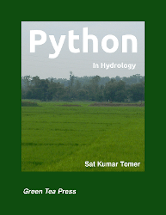 Python in Hydrology is written for learning Python using its applications in hydrology. The book covers the basic applications of hydrology, and also the advanced topic like use of copula.
Python in Hydrology is written for learning Python using its applications in hydrology. The book covers the basic applications of hydrology, and also the advanced topic like use of copula.
The book is available under the GNU Free Documentation License. Readers are free to copy and distribute the text; they are also free to modify it, which allows them to adapt the book to different needs, and to help develop new material.
37. The Coder’s Apprentice by Pieter Spronck
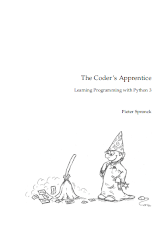 “The Coder’s Apprentice” is a course book hat is aimed at teaching Python 3 to students and teenagers who are completely new to programming.
“The Coder’s Apprentice” is a course book hat is aimed at teaching Python 3 to students and teenagers who are completely new to programming.
Contrary to many of the other books that teach Python programming, this book assumes no previous knowledge of programming on the part of the students, and contains numerous exercises that allow students to train their programming skills.
38. Full Stack Python by Matt Makai
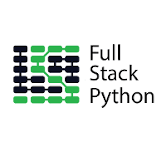 Full Stack Python is an open book that explains how to create, deploy, and operate Python web applications. Concepts are explained in plain language.
Full Stack Python is an open book that explains how to create, deploy, and operate Python web applications. Concepts are explained in plain language.
Chapters cover development environments, testing, documentation, security, web development (frameworks, template engines web design, Javascript, task queries, architectures, static site generators), Web App deployment, data, web APIs, and DevOps.
The book is published under the MIT License.
39. The Little Book of Python Anti-Patterns
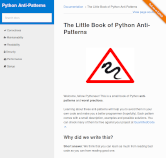 This is a small book of Python anti-patterns and worst practices.
This is a small book of Python anti-patterns and worst practices.
Learning about these anti-patterns will help you to avoid them in your own code and make you a better programmer (hopefully). Each pattern comes with a small description, examples and possible solutions.
This document is licensed under a Creative Commons NC license.
40. The Standard Python Library by Fredrik Lundh
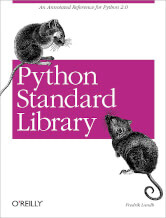 Based in part on over 3,000 newsgroup articles written by Python veteran Fredrik Lundh since 1995, this book provides brief descriptions and sample scripts for all standard modules in the Python 2.0 library.
Based in part on over 3,000 newsgroup articles written by Python veteran Fredrik Lundh since 1995, this book provides brief descriptions and sample scripts for all standard modules in the Python 2.0 library.
Note that the book was written for Python 2.0, but most of the code still works in current versions.
Next page: Page 9 – Tiny Python 3.6 Notebook and more books
Pages in this article:
Page 1 – Think Python and more books
Page 2 – Supporting Python 3 and more books
Page 3 – Invent Your Own Computer Games with Python and more books
Page 4 – Making Games with Python & Pygame and more books
Page 5 – Hacking Secret Ciphers with Python and more books
Page 6 – Learn Python, Break Python and more books
Page 7 – Modeling Creativity: Case Studies in Python and more books
Page 8 – Python in Hydrology and more books
Page 9 – Tiny Python 3.6 Notebook and more books
All books in this series:
| Free Programming Books | |
|---|---|
| Ada | ALGOL-like programming language, extended from Pascal and other languages |
| Agda | Dependently typed functional language based on intuitionistic Type Theory |
| Arduino | Inexpensive, flexible, open source microcontroller platform |
| Assembly | As close to writing machine code without writing in pure hexadecimal |
| Awk | Versatile language designed for pattern scanning and processing language |
| Bash | Shell and command language; popular both as a shell and a scripting language |
| BASIC | Beginner’s All-purpose Symbolic Instruction Code |
| C | General-purpose, procedural, portable, high-level language |
| C++ | General-purpose, portable, free-form, multi-paradigm language |
| C# | Combines the power and flexibility of C++ with the simplicity of Visual Basic |
| Clojure | Dialect of the Lisp programming language |
| ClojureScript | Compiler for Clojure that targets JavaScript |
| COBOL | Common Business-Oriented Language |
| CoffeeScript | Transcompiles into JavaScript inspired by Ruby, Python and Haskell |
| Coq | Dependently typed language similar to Agda, Idris, F* and others |
| Crystal | General-purpose, concurrent, multi-paradigm, object-oriented language |
| CSS | CSS (Cascading Style Sheets) specifies a web page’s appearance |
| D | General-purpose systems programming language with a C-like syntax |
| Dart | Client-optimized language for fast apps on multiple platforms |
| Dylan | Multi-paradigm language supporting functional and object-oriented coding |
| ECMAScript | Best known as the language embedded in web browsers |
| Eiffel | Object-oriented language designed by Bertrand Meyer |
| Elixir | Relatively new functional language running on the Erlang virtual machine |
| Erlang | General-purpose, concurrent, declarative, functional language |
| F# | Uses functional, imperative, and object-oriented programming methods |
| Factor | Dynamic stack-based programming language |
| Forth | Imperative stack-based programming language |
| Fortran | The first high-level language, using the first compiler |
| Go | Compiled, statically typed programming language |
| Groovy | Powerful, optionally typed and dynamic language |
| Haskell | Standardized, general-purpose, polymorphically, statically typed language |
| HTML | HyperText Markup Language |
| Icon | Wide variety of features for processing and presenting symbolic data |
| J | Array programming language based primarily on APL |
| Java | General-purpose, concurrent, class-based, object-oriented, high-level language |
| JavaScript | Interpreted, prototype-based, scripting language |
| Julia | High-level, high-performance language for technical computing |
| Kotlin | More modern version of Java |
| LabVIEW | Designed to enable domain experts to build power systems quickly |
| LaTeX | Professional document preparation system and document markup language |
| Lisp | Unique features - excellent to study programming constructs |
| Logo | Dialect of Lisp that features interactivity, modularity, extensibility |
| Lua | Designed as an embeddable scripting language |
| Markdown | Plain text formatting syntax designed to be easy-to-read and easy-to-write |
| Objective-C | Object-oriented language that adds Smalltalk-style messaging to C |
| OCaml | The main implementation of the Caml language |
| Pascal | Imperative and procedural language designed in the late 1960s |
| Perl | High-level, general-purpose, interpreted, scripting, dynamic language |
| PHP | PHP has been at the helm of the web for many years |
| PostScript | Interpreted, stack-based and Turing complete language |
| Prolog | A general purpose, declarative, logic programming language |
| PureScript | Small strongly, statically typed language compiling to JavaScript |
| Python | General-purpose, structured, powerful language |
| QML | Hierarchical declarative language for user interface layout - JSON-like syntax |
| R | De facto standard among statisticians and data analysts |
| Racket | General-purpose, object-oriented, multi-paradigm, functional language |
| Raku | Member of the Perl family of programming languages |
| Ruby | General purpose, scripting, structured, flexible, fully object-oriented language |
| Rust | Ideal for systems, embedded, and other performance critical code |
| Scala | Modern, object-functional, multi-paradigm, Java-based language |
| Scheme | A general-purpose, functional language descended from Lisp and Algol |
| Scratch | Visual programming language designed for 8-16 year-old children |
| SQL | Access and manipulate data held in a relational database management system |
| Standard ML | General-purpose functional language characterized as "Lisp with types" |
| Swift | Powerful and intuitive general-purpose programming language |
| Tcl | Dynamic language based on concepts of Lisp, C, and Unix shells |
| TeX | Markup and programming language - create professional quality typeset text |
| TypeScript | Strict syntactical superset of JavaScript adding optional static typing |
| Vala | Object-oriented language, syntactically similar to C# |
| VHDL | Hardware description language used in electronic design automation |
| VimL | Powerful scripting language of the Vim editor |
| XML | Rules for defining semantic tags describing structure ad meaning |
